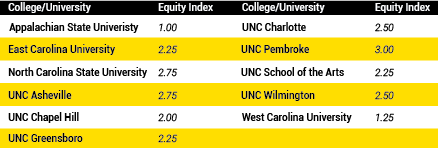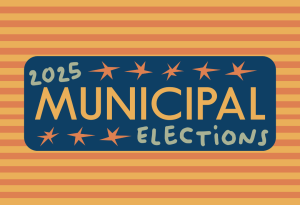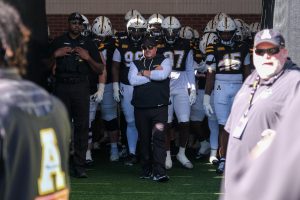App State ranked last in North Carolina by black student equity report
September 26, 2018
App State was given an F in Representation Equity, a D in Gender Equity, a D in Completion Equity and a C in Black Student-to-Black Faculty Ratio in a 50-state report conducted by the USC Race and Equity Center.
The report was conducted to study the status of black students at every four-year, non-specialized, public postsecondary institution in the nation, according to the USC Race and Equity Center.
Shaun Harper, founder and executive director of the race and equity center, said less-diverse schools are scattered across the country. He also said the study shows the widespread ways in which public institutions are failing black students.
“I think all credible reports, like this one, are important for self-examination,” Willie Fleming, App State chief diversity officer, said in an email.
North Carolina’s overall equity index score was a 2.23 while App State’s overall score was 1.00. Western Carolina came in second to last with a 1.25 score and the highest score was UNC-Pembroke at 3.00.
Harper said one goal of the study is for schools to collaborate. For example, schools that receive an A in a category would teach best practices to schools in their state that scored poorly in the same category. Harper said each category is important because it gives institutions to see specifically where they are failing.
“Some schools need to understand: sure, you got black students to come there, but you failed them once they got there,” Harper said.
The USC report only provides data about black students. It does not provide any data related to other races or diverse identities.
“Other kinds of diversity are important on campuses, too, but our goal was to show the areas where institutions could improve for black students,” Harper said.
For App States Student Government Association, they believe that reports like this are important.
“SGA as an organization understands how important it is that these reports come out and that they happen because they expose the true inequalities of higher education,” Gaby Romero, sophomore anthropology major and director of social sustainability, said.
Kendall Rankin, Black Student Association graduate assistant studying public administration with a focus in diversity management, said he thought having different identities and perspectives in the classroom would expand academic freedom.
The study was done based on statistics from the 2016-2017 school year and involved 506 public institutions in all 50 states.
Romero said they thought diversity is already being improved as the Honors College is made up of 25 percent of diverse students. Three years ago it was 12 percent.
“I absolutely think that the grades will get better,” Romero said. “I think we have already seen huge growth when it comes to that and I feel like we’re going to see more in the future.”
App State’s highest grade was a C in Black Student-to-Black Faculty Ratio. The ratio of black students to black faculty at App State is 35-to-1.
“In my program I’m focused on diversity management and a lot of the research shows that the more diverse of faculty staff that you have, the more likely it is that you’ll be able to recruit students from other marginalized populations as well,” Rankin said.
Black students make up 3.6 percent of the student population for the fall 2018 semester while white students make up 82 percent of the student population, according to App State Institutional Research, Assessment and Planning data.
“I think (this report) has shown what we’ve always known: That there are students who don’t feel comfortable and don’t feel represented,” Romero said.
While this report was done on the 2016-17 statistics, Fleming said he believes that App State will have a better grade in the future.
“Our overall university population is now the most diverse in university’s history, and our underrepresented population has grown more than 35% in four years,” Fleming wrote. “It is important we are not only improving numbers but that we are also working on a culture of inclusive excellence.”
Fleming also wrote that App State is always striving for improvement and that people should read this report as well as App State’s own institutional data.
“I truly believe our students, faculty and staff believe in inclusive excellence and in valuing all people, and we are working every day as a campus to live these values,” Fleming wrote.
To download the complete report, visit https://race.usc.edu/.













